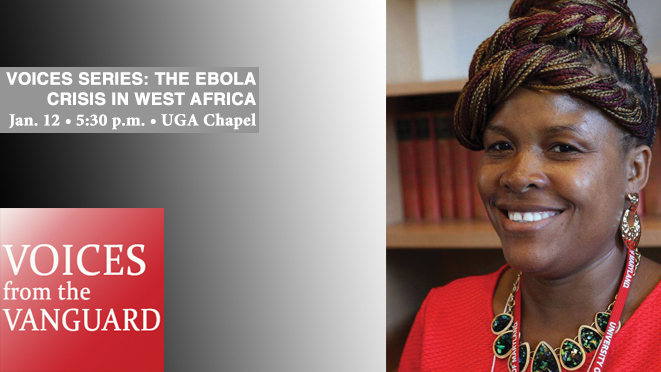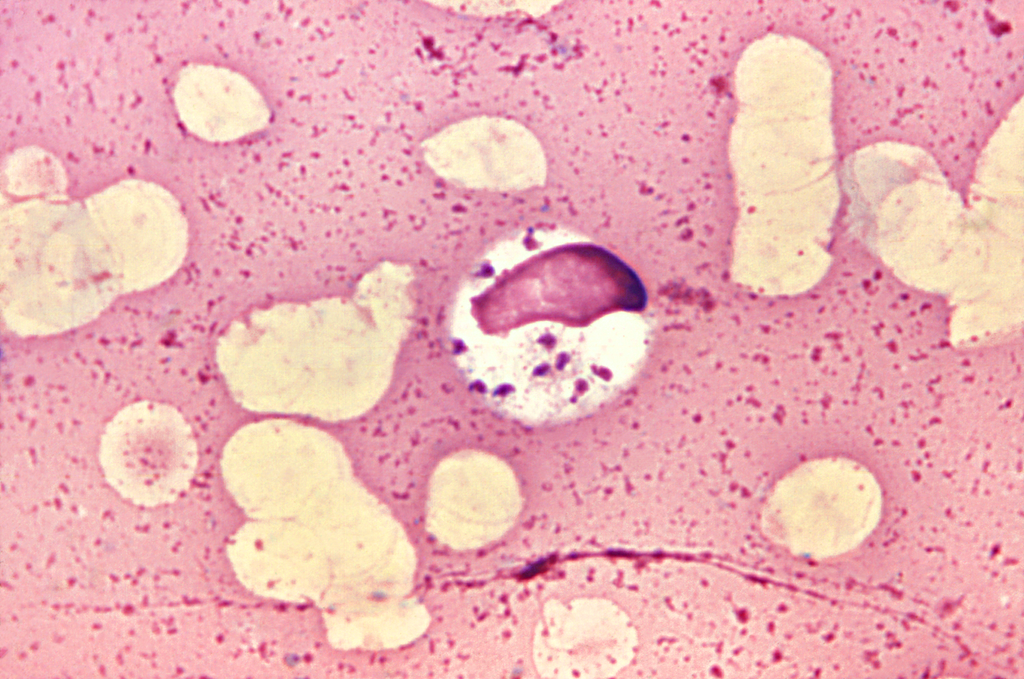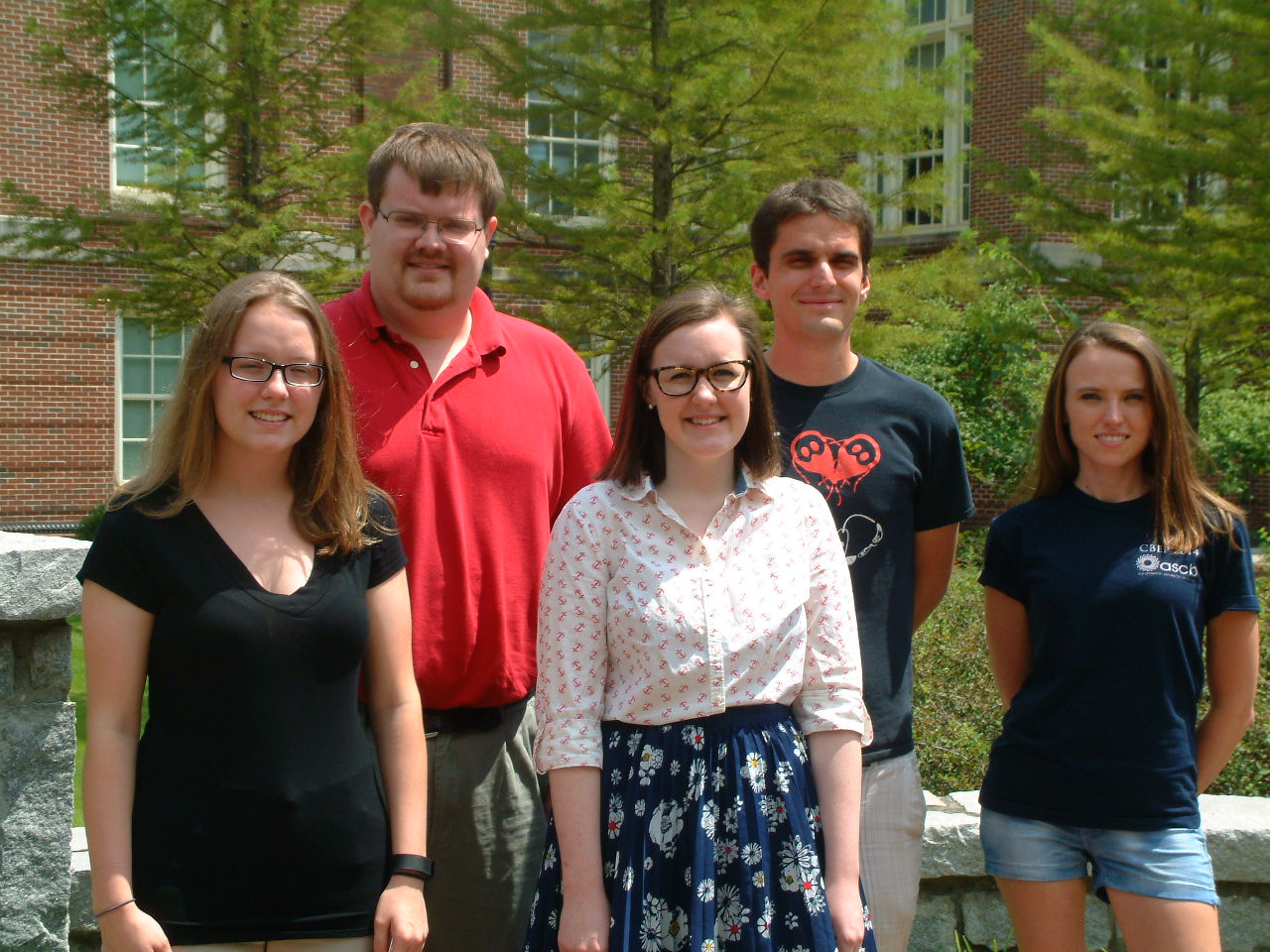UGA researchers discover how trypanosome parasites communicate with each other

Athens, Ga. – While scientists have known for years that African trypanosomes cause sleeping sickness, they’ve been left scratching their heads as to how these tiny single-celled organisms communicate. A University of Georgia study, published Jan. 14 in the journal Cell, helps solve this mystery.
The UGA researchers discovered that long filaments—that look like beads on a string—form by budding from the flagellum of African trypanosomes and then release pieces of the parasite into the host. This causes anemia and influences the outcome of infection leading to human African sleeping sickness and the cattle disease nagana.
The UGA researchers theorize that the extracellular vesicles, as the free-floating beads are scientifically known, are being used by the parasite to communicate with each other and with the host’s body. Even before they pop off into vesicles, the nanotubes extending from the flagellum help the single-celled parasites talk to each other. The severe anemia caused by the parasites may be an accidental side effect of the extracellular vesicles fusing with host red blood cells.
There were 6,314 new cases of African sleeping sickness in 2013. The disease, fatal if left untreated, threatens millions of people annually in the 36 countries in sub-Saharan Africa where the parasite-transmitting tsetse fly lives, according to the World Health Organization.
The research findings provide another clue to how African trypanosomes infect humans. It may also lead to improved therapies to fight sleeping sickness; current medications used to combat the disease have improved over the past decade but still include an old arsenic-based drug that kills between 5 and 10 percent of the people receiving treatment, said the study’s senior author Stephen Hajduk, a professor of biochemistry and molecular biology in the UGA Franklin College of Arts and Sciences.
The parasite also causes major economic losses by infecting and killing between 5 million and 7 million cattle each year through nagana, he said.
The research into trypanosome nanotubes and extracellular vesicles started as a side project in Hajduk’s lab about two years ago. As the study’s lead author Tony Szempruch spent more time peering into a microscope, the tiny, wiggly organism revealed its cellular communication potential.
“What you see here,” he said, pointing at the flagellum, “is that you can get that synthesis of the nanotube, but then it will quickly break down into what appears to be free vesicles that float out of focus.”
Szempruch, a doctoral student in the biochemistry and molecular biology department, developed a 3-D reconstruction of the nanotubes budding at the flagellum membrane. He was then able to look at the relationship of the flagellum, nanotubes and extracellular vesicles.
“The whole project developed out of our interest in how trypanosomes interact with one another,” Hajduk said. “Traditionally, people didn’t think of a single-celled organism needing to communicate with each other. But it has become more and more clear that they do.
“They’re actually able to sense when they’re at a certain level in the mammalian host in the bloodstream and then are able to respond to that in some way. As it turns out, a lot of this came together in looking at these extracellular vesicles that we’ve identified.”
Hajduk first noticed the nanotubes in 1978 when he was a doctoral student at the University of Glasgow, and they were first noted in a scientific publication in 1912.
“Even back then, we saw a lot of these extensions coming off the posterior end of the cell,” he said. “I think everyone has seen them, and, until now, everyone has ignored them. The parasite world—and trypanosome world—has largely lagged behind.”
Their findings—that nanotubes and vesicles are an important part of the communications process—show that the extracellular vesicles contribute to the complexity of African trypanosomiasis through the transfer of virulence factors between parasites and inadvertent interaction with host cells, which has a profound effect on disease, the study notes.
More research is needed into nanotubes in particular, Hajduk and Szempruch said. There’s also a great deal of interest in using the structures for non-invasive diagnostics and for targeted therapeutic use.
“The whole signaling thing, people are very excited about that,” Hajduk said, “whether it’s infectious disease or cancer or specific therapeutic development” to treat sleeping sickness.
“The fact that these vesicles are fusing with other host cells presents an interesting target for a therapeutic approach,” Szempruch said. “Perhaps treatment wouldn’t kill the parasite, but it would stop severe pathology associated with the parasite infection.”
UGA study co-authors included Steven Sykes, Rudo Kieft, Lauren Dennison, Allison Becker, Anzio Gartrell and William Martin, with John Harrington as a co-corresponding author, as well as Ernesto Nakayasu at Pacific Northwest National Laboratory and Igor Almeida at the University of Texas.
The study, “Extracellular vesicles from Trypanosoma brucei mediate virulence factor transfer and cause host anemia,” was supported by the National Institutes of Health under grant numbers AI039033, AI060546 and 2G12MD007592.
A video of nanotube breakdown into vesicles is available at http://multimedia.uga.edu/media/video/vesicles.mov.
Writer: Stephanie Schupska
Contact:Stephen Hajduk
Kitchen utensils can spread bacteria between foods, UGA study finds
Griffin, Ga. – In a recent study funded by the U.S. Food and Drug Administration, University of Georgia researchers found that produce that contained bacteria would contaminate other produce items through the continued use of knives or graters—the bacteria would latch on to the utensils commonly found in consumers’ homes and spread to the next item.
Unfortunately, many consumers are unaware that utensils and other surfaces at home can contribute to the spread of bacteria, said the study’s lead author Marilyn Erickson, an associate professor in the College of Agricultural and Environmental Sciences’ department of food science and technology.
“Just knowing that utensils may lead to cross-contamination is important,” Erickson said. “With that knowledge, consumers are then more likely to make sure they wash them in between uses.”
Erickson has been researching produce for the past 10 years. Her past work has mainly focused on the fate of bacteria on produce when it’s introduced to plants in the field during farming.
In 2013, she was co-author on a study looking at the transfer of norovirus and hepatitis A between produce and common kitchen utensils—finding that cutting and grating increased the number of contaminated produce items when that utensil had first been used to process a contaminated item.
This study, published in Food Microbiology, is similar in that it considers the influence that knives and graters have on the transfer of pathogenic bacteria to and from produce items. She urges consumers to realize that these germs can spread in their kitchens as well.
Researchers have known that poor hygiene and improper food preparation practices in a consumer’s home can lead to foodborne illnesses, but considering what practices in the kitchen are more likely to lead to contamination has not been examined extensively.
“The FDA was interested in getting more accurate numbers as to what level of cross-contamination could occur in the kitchen using standard practices,” Erickson said.
In her recent study, Erickson contaminated many types of fruits and vegetables in her lab—adding certain pathogens that often can be found on these foods, such as salmonella and E. coli.
Using a knife, Erickson would cut into things like tomatoes or cantaloupe and other types of produce to see how easily the bacteria could spread when the knife was continuously used without being cleaned. Because they “were looking at what would be the worst-case scenario,” she said, Erickson and study co-authors did not wash between cutting these different produce items.
Researchers also grated produce, like carrots, to see how easily the pathogens spread to graters. They found that both knives and graters can cause additional cross-contamination in the kitchen and that the pathogens were spread from produce to produce if they hadn’t washed the utensils.
“A lot of the broken up material and particles from the contaminated produce remained on the graters,” said Erickson, who conducts her research at the UGA Center for Food Safety in Griffin. “Then if you were to shred another carrot or something else immediately after that, it gets contaminated, too.”
The study also found that certain fruits and vegetables spread pathogens to knives to different degrees.
“For items like tomatoes, we tended to have a higher contamination of the knives than when we cut strawberries,” Erickson said. “We don’t have a specific answer as to why there are differences between the different produce groups. But we do know that once a pathogen gets on the food, it’s difficult to remove.”
Knives and graters aren’t the only utensils in the kitchen consumers should be worried about. Erickson has also helped study the role brushes and peelers have on the transfer of dangerous kitchen bacteria.
In concurrent studies, Erickson found that scrubbing or peeling produce items—like melons, carrots and celery—did not eliminate contamination on the produce item but led to contamination of the brush or peeler. Even when placed under running water, the utensils still became contaminated; however, the ability to cross-contaminate later produce items depended on the brush type and the pathogenic agent.
These studies combined give researchers a better idea as to how common cross-contamination is in the kitchen—even when just using standard practices.
Erickson explained there is a small chance of buying fruits and vegetables contaminated with bacteria, but the problem can occur-whether the product is store-bought or locally grown.
Additional study co-authors were Qing Wang, a doctoral student at the University of Delaware, and Jean Liao, a research professional; and associate professors Jennifer Cannon and Ynes Ortega with UGA’s Center for Food Safety and the Center for Tropical and Emerging Global Diseases.
The study, “Contamination of knives and graters by bacterial foodborne pathogens during slicing and grating of produce,” is available at http://www.sciencedirect.com/science/article/pii/S0740002015001306.
Writer: Sydney Devine
Contact:Marilyn Erickson
UGA researcher receives $1 million for cryptosporidium research

Athens, Ga. – Researchers at the University of Georgia have received $1 million from the Wellcome Trust and the Bill & Melinda Gates Foundation to speed the development of new drugs for the treatment of cryptosporidiosis, a major cause of diarrheal disease and mortality in young children around the world.
Cryptosporidiosis is caused by cryptosporidium, a microscopic parasite commonly spread through tainted drinking or recreational water. There is currently no vaccine and only a single drug of modest efficacy available to treat cryptosporidiosis.
“Cryptosporidiosis is a tremendous public health challenge,” said Boris Striepen, Distinguished Research Professor in Cellular Biology in the Franklin College of Arts and Sciences and a member of UGA’s Center for Tropical and Emerging Global Diseases. “We are extremely grateful to the Trust and the Foundation for providing generous support and leadership to drive a global research agenda to face this challenge.”
Cryptosporidium is notoriously difficult to study in the laboratory, and this has stalled the development of better treatments. But earlier this year, Striepen and his research group created new tools to genetically manipulate the parasite, and his team will use funds from the Wellcome Trust and Gates Foundation to leverage this new technology and speed drug discovery.
The Wellcome Trust’s Pathfinder Award of $244,000 will support a collaboration between UGA and the Novartis Institute for Tropical Diseases, a public-private partnership between the pharmaceutical company Novartis and the Singapore Economic Development Board.
The Novartis Institute for Tropical Diseases “has been at the forefront of discovery of new treatments for malaria, tuberculosis and sleeping sickness,” Striepen said. “Engaging a group with this track record to the problem of cryptosporidiosis will be game changing.”
The primary goal of the joint project is to develop better assays to evaluate the effectiveness of drugs in cell cultures and mice. These assays will be used to discover novel candidate drugs using the Novartis Institute for Tropical Diseases’ large collection of candidates.
A $775,000 grant from the Bill & Melinda Gates Foundation will support the development of genetic technology to discover specific drug targets within the parasite, which will ultimately help enhance drug potency and reduce side effects.
Initially, the project will validate targets for drugs for which predictions for likely candidates can be made from prior experience-in particular from the related malaria parasite. In a second phase the project will discover the yet unknown targets of novel drugs.
“The need for effective treatment of cryptosporidiosis is critical, both nationally and internationally. This highly welcome initiative is a major step for those millions of children who globally suffer from this devastating disease,” said Dan Colley, director of CTEGD and former director of the CDC’s Division of Parasitic Diseases.
For more information on the UGA Center for Tropical and Emerging Global Diseases, visit http://ctegd.uga.edu/.
The Wellcome Trust is a global charitable foundation dedicated to improving health. For more information, visit www.wellcome.ac.uk.
Writer: Donna Huber
Contact:Boris Striepen




